This article needs additional citations for verification .(October 2015) |
Get Online Week is an annual campaign that takes place in the UK and Europe.
This article needs additional citations for verification .(October 2015) |
Get Online Week is an annual campaign that takes place in the UK and Europe.
In 2007, UK online centres first marked out a date in October to bring digital inclusion to national attention. Since then the campaign has grown into a week-long annual celebration, with thousands of events taking place each year in centres and more unusual locations, bringing digital skills and know-how to everyone.
The 2010 event took place on 18–24 October 2010. [1] [2] In 2014, Get Online week took place on 13–19 October, with 1,103 locations running 5,000 events, with 80,000 participants. [3] In 2015, the campaign took place on 12–18 October, organised by Tinder Foundation. It claims to be the biggest UK digital inclusion campaign. [4]
It is organised by Tinder Foundation a UK-based charity.[ citation needed ]
2013 was the 7th annual October event from UK online centres. Previously 'Get online week' was called 'Get online day' [5] but the decision was made to change the name for 2010 and stretch the campaign over a week. This was due to the natural growth of the campaign and previous feedback that a day wasn't enough time to fit in all the activities that were arranged. Typically, Get online week's many events and promotional activities now happen throughout the whole month of October.[ citation needed ]
UK online centres teamed up with a range of external partners who generated huge amounts of publicity for Get online week. They include the BBC, BT, Three, Post Office, TalkTalk, Facebook, EE and MLA amongst many others. Partners also hold their own events or direct people to one of the 3,800 UK online centres which are situated around England.[ citation needed ]
The first European Get Online Day took place on 4 March 2010. [6] It was inspired by the UK event, and it later became an annual campaign lasting a week, run by Telecentre Europe. [7]
| Date | Notes | References |
|---|---|---|
| 4 March 2010 | [6] | |
| 28 Feb-5 March 2011 | [8] | |
| 26–30 March 2012 | [9] | |
| 18–24 March 2013 | [10] | |
| 24–30 March 2014 | [11] |
The European Get Online Week was inspired by the campaign with the same name run by UK online centres (now Tinder Foundation) in the UK. Telecentre Europe extended it to the European level, to get new computer users online by helping them to get through the doors of their local ICT learning centres, enabling the staff to build people's confidence to move on into a more structured learning. Since its take-off in 2010, the Get Online Week campaign has reached more than 600.000 Europeans in more than 20.000 learning centres across Europe. Thanks to the campaign, more than 100.000 people have used the Internet for the very first time.[ citation needed ]

Comic Relief is a British charity, founded in 1985 by the comedy scriptwriter Richard Curtis and comedian Sir Lenny Henry in response to the famine in Ethiopia. The concept of Comic Relief was to get British comedians to make the public laugh, while raising money to help people around the world and in the United Kingdom. A new CEO, Samir Patel, was announced in January 2021.
Rags are student-run charitable fundraising organisations that are widespread in the United Kingdom and Ireland. Some are run as student societies whilst others sit with campaigns within their student unions. Most universities in the UK and Ireland, as well as some in the Netherlands and the Commonwealth countries of South Africa and Singapore have a rag. In some universities rags are known as Charities Campaigns, Charity Appeals, Charity Committees, Jool or Karnivals, but they all share many attributes.

May Week is the name used in the University of Cambridge to refer to a period at the end of the academic year. Originally May Week took place in the week during May before year-end exams began. Nowadays, May Week takes place in June after exams, and is a cause for great celebration amongst the students of the University. Highlights of the week include bumps races, May Balls, June Events and garden parties.

A telecentre is a public place where people can access computers, the Internet, and other digital technologies that enable them to gather information, create, learn, and communicate with others while they develop essential digital skills. Telecentres exist in almost every country, although they sometimes go by a different names including public internet access center (PIAP), village knowledge center, infocenter, Telecottage, Electronic Village Hall, community technology center (CTC), community multimedia center (CMC), multipurpose community telecentre (MCT), Common/Citizen Service Centre (CSC) and school-based telecentre. While each telecentre is different, their common focus is on the use of digital technologies to support community, economic, educational, and social development—reducing isolation, bridging the digital divide, promoting health issues, creating economic opportunities, leveraging information communications technology for development (ICT4D), and empowering youth.

Science Week Ireland is an annual week-long event in Ireland each November, celebrating science in our everyday lives. Science Week is an initiative of Science Foundation Ireland (SFI) It is the largest science festival in the country, engaging tens of thousands of members of the general public in workshops, science shows, talks, laboratory demonstrations, science walks and other science-related events. Science Week is a collaboration of events involving industry, colleges, schools, libraries, teachers, researchers and students throughout Ireland.
The Big Draw, formerly the Campaign for Drawing, is a British registered charity that promotes drawing and visual literacy. It was founded in 2000 by the Guild of St George, and is now an independent charity.
The Online Centres Network is a UK-based network which helps communities tackle social and digital exclusion.

The Asia-Pacific Telecentre Network (APTN) is a collaborative initiative of the United Nations Economic and Social Commission for Asia and the Pacific (UN-ESCAP) and telecentre.org. The APTN Secretariat is hosted at ICT Agency of Sri Lanka (ICTA). APTN is dedicated to promote innovation and knowledge sharing amongst telecentres in the Asia-Pacific region where telecentres are growing exponentially each year. APTN is working towards creating a platform of networks of telecentres, to share experiences on issues of their interest and to cooperate on the development of solutions for common problems of the telecentres themselves in order to empower poor and disadvantaged communities with Information and Communication Technology (ICT) in the Asia Pacific Region. In other words, APTN will serve as the focal network or the knowledge hub for communication and information technology in the Asia Pacific region.

Pride in Liverpool, is an annual festival of LGBT culture which takes place across various locations in Liverpool City Centre including the gay quarter. Audience numbers reach up to 75,000 people, making it one of the largest free Gay Pride festivals in Europe.

The Trades Union Congress (TUC) is a national trade union centre, a federation of trade unions that collectively represent most unionised workers in England and Wales. There are 48 affiliated unions with a total of about 5.5 million members. Paul Nowak is the TUC's current General Secretary, serving from January 2023.
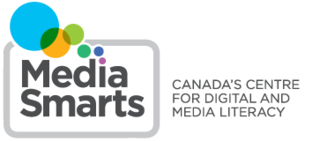
MediaSmarts is a Canadian non-profit organization and registered charity based in Ottawa, Ontario, that focuses on digital and media literacy programs and resources. In particular, the organization promotes critical thinking via educational resources and analyzes the content of various types of mass media.
Good Things Foundation is a registered charity based in the UK, the objective of which is to make the benefits of digital technology more accessible. It manages the Online Centres Network, the Learn My Way learning platform, and the National Databank.
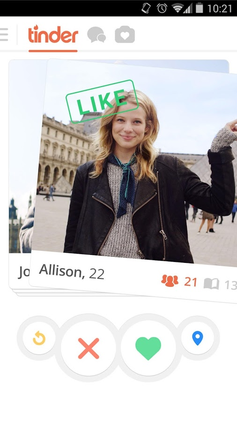
Tinder is an online dating and geosocial networking application launched in 2012. On Tinder, users "swipe right" to like or "swipe left" to dislike other users' profiles, which include their photos, a short bio, and some of their interests. Tinder uses a "double opt-in" system, also called "matching", where two users must like each other before they can exchange messages.
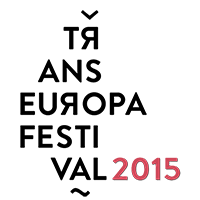
The Transeuropa Festival is a bi-annual festival of culture, arts and politics held in different European cities since 2010. It includes discussions, presentations and workshops concerning transnational issues.
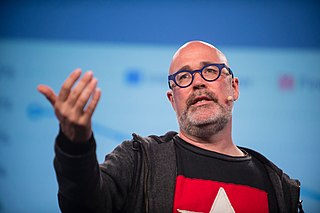
Mark Surman is a Canadian open internet activist and the president and executive director of the Mozilla Foundation. He is a leading advocate for trustworthy AI, digital privacy, and the open internet. Before joining the Mozilla Foundation, Mark spent more than 15 years leading organizations and projects promoting the use of the internet and open source for social empowerment in many countries around the world.

An edit-a-thon is an event where some editors of online communities such as Wikipedia, OpenStreetMap, and LocalWiki edit and improve a specific topic or type of content. The events typically include basic editing training for new editors and may be combined with a more general social meetup. The word is a portmanteau of "edit" and "marathon". An edit-a-thon can either be "in-person" or online or a blended version of both. If it is not in-person, it is usually called a "virtual edit-a-thon" or "online edit-a-thon".
Helen Louise Milner OBE is the Chief Executive of the Good Things Foundation, a digital inclusion and social inclusion charity based in the UK. Following a 30-year career working on the internet and with communities, in 2012 Milner was inducted into the British Interactive Media Association's Digital Hall of Fame, and in 2013 became a member of The House of Commons Speaker's Commission for Digital Democracy. In June 2015 Milner was appointed an OBE for services to digital inclusion in the Queen's Birthday Honours List.
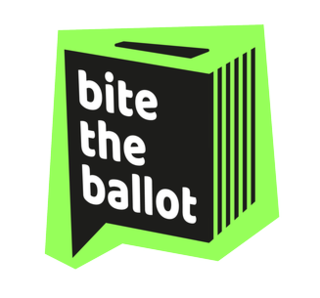
Bite The Ballot (BTB) is a party-neutral movement and registered youth democracy charity, based in the United Kingdom. Its mission is to empower young people to evolve UK democracy.

Fashion Revolution is a not-for-profit global movement represented by Fashion Revolution CIC with teams in over 75 countries around the world. Fashion Revolution campaigns for reform of the fashion industry with a focus on the need for greater transparency in the fashion supply chain. Starting in 2014, Fashion Revolution marks the anniversary of the Rana Plaza disaster in Bangladesh with Fashion Revolution Week and holds events each year. Between 2014 and 2020, millions of people around the world called on brands to answer the question Who Made My Clothes? The hashtag #WhoMadeMyClothes became the no.1 global trend on Twitter. They have faced criticisms specifically about the Global Fashion Transparency Index.

Global Goals Week is a shared commitment between a coalition of over 160 partners across all industries, which mobilizes annually in September to bring together communities, demand urgency, and supercharge solutions for the Sustainable Development Goals (SDGs). It was founded in 2016 by the United Nations Foundation, Project Everyone, and the United Nations Development Programme (UNDP). It is timed to coincide with the UN General Assembly "High-Level Week" in New York. The week includes events, summits, conferences, forums, workshops, pledges, and other activations in New York, around the world, and online. It usually runs alongside Climate Week NYC, the annual conference of Goalkeepers, Bloomberg Global Business Forum and many other high-level events.